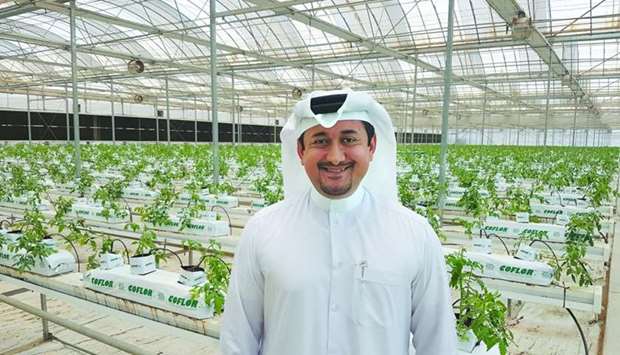Speaking to Gulf Times, Agrico managing director Nasser Ahmed al-Khalaf said they made a lot of modifications in hydroponics farming to produce an all-organic fresh produce to meet the growing demand in Qatar.
Agrico, a private local Qatari agricultural development company established in 2011 with the aim of helping Qatar achieve food security, operates a 120,000sqm (12 hectare) organic farm in Al Khor. Its first production was in May 2012.
“The Asians, European or Western people have not developed a system that would be suitable for this area, especially for Qatar,” he stressed. “What we did is to develop our own system which is suitable for our environment.”

Organic eggplants at the 120,000sqm hydroponics farm in Al Khor
The local farm owner noted that vegetable-exporting countries in Asia, Europe, and America have the technology and knowhow in their region but inapplicable in the Gulf.
Al-Khalaf explained that regions with winter seasons such as Europe, especially those in the northern part, only have heating systems.
But in Qatar, he said they developed a cooling system that can reduce the temperature inside the greenhouse down to 16 degrees, depending on the variety of vegetables and fruits.
Some varieties need 16, 18 or 20 degrees, during a certain time of the day, for the plant to give the right texture, size, and taste, among others.
“Our vegetables they can last for a month on shelf without changing,” he said, adding that they can produce an average of 6 tonnes daily during the summer, which is 30% less compared to their production in the winter. The farm plans to produce more in the near future.
With this technology, he said Qatar has become one of the largest producers of organic vegetables in the world using what he described as a very promising and one-of-its-kind hydroponics technology.

Agrico Organic Farm in Al Khor produces 14 types of tomatoes.
“As long as you are providing the right temperature, right humidity, right amount of light (sun radiation), right fertiliser, and right amount of water, then you can grow anything,” al-Khalaf added. “I guarantee that all types of vegetables can be grown, I have tried this myself and we have been successful on this.”
Agrico has started growing five types of fruits, including papaya and lemon (experimental stage). It expects the plants to bear fruits in a year or two.
As Agrico products continue to supply more than 150 supermarkets and small outlets in Qatar, he said “there will be a lot of surprises soon.”
“We are going to produce root crops, fresh leaf and herbs such as coriander, parsley, green onion, basil, and mint, among others,” he said, adding that producing iceberg lettuce and other types, carrots, potatoes, and white onion, in the next few months.
While Qatar currently imports various types of fresh vegetable and fruits from European, Asian, and American countries, he expressed confidence that the country will soon achieve self-sufficiency.
He noted that even before the economic blockade imposed by the Saudi-led group on June 5, Qatar already has plans to import fresh produce in the future.
System suitable for livestock, poultry, fish farming
Apart from vegetables and fruits, local farm owner Nasser Ahmed al-Khalaf said the cooling system they developed is also suitable for livestock, poultry and fish farming.
“It is an integrated system, we take advantage of the vegetable greenhouses and in between we cool an empty wasted area using the cold air that comes out from the greenhouse,” he added.
Al-Khalaf explained that they harness this cold air, which comes out of the greenhouse, for testing an area of his farm for growing fruits. This can bring down the temperature from 45 degrees, for example, to 27 degrees in an open field.
The system, from temperature, humidity to sun radiation and water irrigation, has to be monitored round-the-clock seven days a week, according to the farm owner.
“Even if I am abroad I get a warning from my mobile phone if any abnormality happens,” he noted.




